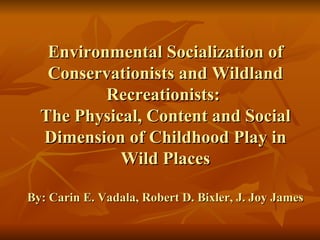
Childhood Play
- 1. Environmental Socialization of Conservationists and Wildland Recreationists: The Physical, Content and Social Dimension of Childhood Play in Wild Places By: Carin E. Vadala, Robert D. Bixler, J. Joy James
- 8. Play Places Interstitial Space dumpster diving, drainage ditches, golf course woods, bridges, storm sewer Nature
- 9. Play Content Creating Structure forts, tree houses shelter Games hide & seek, dam wars monkey tag Searching, Catching, Trapping fossils, insects, old bottles, lizards Fantasy Play movies, tv shows Creative Act clays, potions
- 10. Pick berries Hauling water Chop wood Rehab wildlife Pets Interstitial Play Through Chores Garden, flower/ vegetable
- 11. Spatial Play Exploration ditches, following creeks Near-Distant/Stationary forts and tree houses Away From Home vacation, relatives
- 12. Tomboy Camp/ summer friends Playmates Perception of safety Camps Travel to Live near Experience with Social Facilitation/ Interpretation of Play Parents Peers
- 17. Questions?
Hinweis der Redaktion
- Adults, as opposed to children, were interviewed to identify concrete life history paths that led to their careers as avid conservationists and wildland recreationists. Most interviewees were nominated based on being avid or passionate about their interest by a regionally or nationally recognized leader in conservation work or wildland recreation. A contrast group composed of people clearly disinterested in the outdoors or the environment was used to check for similar/dissimilar experiences to those reported by the main study group. Transcriptions of interviews were coded for themes, then recoded at a somewhat more abstract level into organizing themes. Finally, a global theme was identified. The analysis procedure followed the recommendations of Attride-Stirling (2001) for constructing thematic networks from qualitative data.
- We’ve got a water shed across the street that has been kind of wiggled away over time but I think it’s about as small as it’s going to get at this point. There was plans to…they built a new development recently about ten minutes away and they were going to run some of the sewer system through there and there was a lot of neighborhood meetings and city council meetings. My neighborhood and the other neighborhood put up a real fierce protest to that because the feeling was that putting a sewer system through there was more of an excuse to open the area up as opposed to running the sewer system through there. Sometimes I would just go back there to get away from things.
- “ Mostly well, it was mostly boys, so we did play war. You know it was…we did build forts. We had, you know, the same group of guys, so I remember we had bases set up at some point, you know, different points throughout the woods. And, you know, there were natural forts. We’d just gather sticks together and play behind them.” “” my cousin went one time and we made traps for raccoons out of like Happy Meal boxes.” “ One of the big things was having dam wars, where typically the older tent groups would build their dams further and further upstream and then of course the object was to stop up enough water so that when you open up your floodgates you obliterated the dams below you. This was great fun, you know, when people would open up their floodgates, literally the whole camp would run down the banks of the streams seeing, could a dam hold. Some dams held and were able to alleviate the pressure through their own floodgates and others just got blasted out of the way. “ Yeah, I remember always going out an we’d always find these box turtles and salamanders and things like that. I mean, we weren’t going deep into it, we were right on the edge. We’d kind of poke around and lifting up rocks. I can always remember picking up rocks and finding garter snakes. Make imaginary potions and cake mixes and stuff out of poke berries and mint leaves and anything I could find that is gooey.”
- Mom’s little buddy as far as flowers and mowing goes. Tape for corn, feed the pigs & cattle, bale hay. We did outside as a group, we would work with dad, mom and sister, haul manure to gardening to cutting. Going to new hampshire, splitting wood and feeding the fire, no running water-hauled from a spring. Related these experiences to reading Laura Ingalls ‘Farmer Boy’. Grandma like to cook and sent us out to look for blackberries. And we had this… this robin fell out of its nest and we… we raised that robin… Robby the Robin. And we remember that and I remember the last time we saw it is… we were all standing out in the backyard and this boy comes around, this Boy Scout selling cookies, and my little sister, Danielle, is standing there. Annie’s just a baby. And Robby by that time could fly and he would fly up to this tree and then he would come back when he was hungry. And all of a sudden he comes back… he flies all the way down and he lands on my sister’s head. And there’s this Boy Scout and he goes, “Maam, there’s a bird on your baby’s head.” And we were like, “Oh, yeah, that’s Robby.” And then one day Robby flew away and he never came back.
- The older we got, the further we could go, as long as there were check in periods, you just know when you’ve gone too far, if your parents do find out you’ve gone too far then you get in trouble. Took the longer route to get home, go by the creek, venture in the backyard. Remember being miles away with my bike and getting back at 11, times have changed, we can’t let our daughter play in the front yard without another parent. Alone time was important to me. Mother kicked us outside in the morning and we weren’t allowed to come back until night.